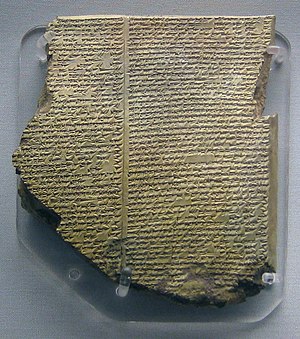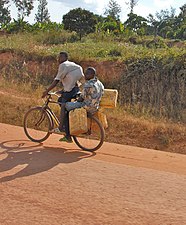Wikipedia:Wikipedia Signpost/2019-07-31/On the bright side
What's making you happy this month?
There are many opportunities to discuss bad news, problems, and concerns in the Wikiverse, and I think that having candid discussions about these issues is often important. Many days I spend more time thinking about problems than about what is going well. However, also I think that acknowledging the good side and taking a moment to be appreciative can be valuable.
I encourage you to add your comments about what's making you happy this month to the talk page of this Signpost piece.
Week of 30 June 2019: Co sprawia, że jesteś szczęśliwy w tym tygodniu?

At the moment I am not particularly happy, but I am grateful. I feel that the English Wikiquote of the day for 30 June 2019 is appropriate to share for contemplation in the context of current tensions.
"What I'm saying here is not, I agree, poetry, as poems should be written rarely and reluctantly, under unbearable duress and only with the hope that good spirits, not evil ones, choose us for their instrument."
— Czesław Miłosz, Polish writer, diplomat, and recipient of a Nobel Prize in Literature
I am grateful for hundreds of colleagues who have participated generously, courageously, and in good faith to advocate for what they believe are the best interests of the Wikiverse projects. (I request that in this Signpost article and its talk page we avoid advocating for particular outcomes so that we remain on topic.)
Week of 7 July 2019: Что делает тебя счастливый на этой неде́ле?
- People bicycling around the world
-
In Australia
-
In Ecuador
-
In England
-
In Rwanda
-
In Sri Lanka
-
In the United States
This past weekend I took time offline to go bicycling, including bicycling on part of the Burke-Gilman Trail. There are photos of the trail and surrounding scenery on Commons, and there is also a Wikidata item for the trail.
I think that time offline for reflection was good. I had in-person conversations that helped me to process recent events on English Wikipedia.

Week of 14 July 2019: ما الذي يمنحك السعادة هذا الأسبوع؟
- Winning photos of the Wiki Loves Africa 2019 campaign on Commons
-
1er prix / 1st prize: Yida refugee camp in South Sudanese territory, by Marco Gualazzini from Italy
-
2ème prix / 2nd prize: Peekaboo, by Summer Farag from Egypt
-
3ème prix / 3rd prize: Boys playing street football, by Mohamed Hozyen Ahmed from Egypt
-
Women in Sport Prize / Prix Femmes et Sport: Girl wrestlers, by Yvonne Youmbi from Cameroun
-
Culture and Tradition Prize / Prix Culture et tradition: Fantasia, by Sofiane Mohammed Amri from Algeria
- Khyati Soneji announced some enhancements to the Program and Events Dashboard for 1lib1ref.
- These articles were linked from the most recent Books and Bytes newsletter of The Wikipedia Library:
- "Teaching intelligence: putting Wikipedia at the heart of a class", by Caroline Ball
- "Integrating Wikidata at the Library of Congress", by Matt Miller
- Alexandros Kosiaris (WMF) presented a Wikimedia Tech Talk, 2019 Episode 6, "A Deployment Pipeline Overview".
- Books and bytes?
-
Books that remind the viewer of The Wikipedia Library
-
Concept for containerized continuous delivery pipeline as presented by WMF Release Engineering at AllHands 2017
Week of 21 July 2019: اس ہفتے آپ کو کیا خوشی ہے؟

I would like to highlight the recognition of the Dehalvi Wikimedia Community User Group and Wikimedia Community User Group Math.
I thought that this thread on Wikitech-l was interesting: "Difference between #goal and #epic".
Last week there were at least two notable anniversaries in space exploration.
- 20 July 1969 was the date that astronauts on the Apollo 11 spaceflight landed on Earth's Moon.
- 23 July 1995 was when two astronomers, one of them being an amateur astronomer, first discovered Comet Hale–Bopp.
I enjoy looking at English Wikipedia featured pictures, including these subcategories of space featured pictures:
My guess is that many of us have looked up at the sky at night and thought about the Moon, the stars, and the planets. Maybe you have seen shooting stars, comets like Hale–Bopp, or the Milky Way. If you have the opportunity to try astronomy or night photography, I encourage you to do so.
I would like to close this section with two quotes.
First, the famous quote by astronaut Neil Armstrong as he first set foot on the Moon: "That's one small step for [a] man, one giant leap for mankind."
Second, a quote by amateur astronomer Thomas Bopp: " I--I'll never give up looking at the skies. There's so many beautiful things there. And I love to share that with people."
- Space
-
A sun dial, dating from the 3rd century BC, found in the ancient Greco-Bactrian Kingdom city of Ai-Khanoum in present-day Afghanistan
-
Portrait of astronomer Galileo Galilei with his assistant Vincenzo Viviani
-
Jocelyn Bell Burnell, co-discoverer of radio pulsars
-
Apollo guidance computer lead programmer Margaret Hamilton with software that was written by her and her team
-
Astronaut Buzz Aldrin as photographed by Neil Armstrong on the surface of the Moon
-
Comet Hale–Bopp seen from Earth in the vicinity of Pazin, Istria County, Croatia
-
A bittersweet photo of the final crew of Space Shuttle Columbia, who perished while returning from Earth orbit
-
The Milky Way Galaxy as seen from the ESO Hotel of the Paranal Observatory in the Atacama Desert, Chile
Week of 28 July 2019: Vad glädjer dig den här veckan?
I’ve always appreciated my fellow Wikimedians. But when I do my normal editing, in my spare time, I respect them as my peers. I’m constantly grateful for the work Tegel does to keep Swedish Wikipedia free from spam and vandalism. In awe of Yger’s ambitious projects related to Swedish geography and administrative districts. Impressed by ArildV’s illustrations. Still miss cooperating with Åsa L on the Swedish science fiction articles. But in my work for the Foundation, there’s a shift – a feeling of being privileged to be part of this project full time.
Take Tech News, for example. Most weeks I write Tech News, a weekly technical newsletter, in an attempt to make it possible to get a quick overview of important technical changes that will affect Wikimedia contributors. Every week it is translated and distributed in a number of languages, typically 15–20 and every week I try to use the thanks function to unobtrusively show my appreciation. The act becomes routine: open the history of every language, thank the person, go to the next translation, thank, thank, thank, thank, thank. But every week that action is fuelled by a profound feeling of gratitude. Years into writing the newsletter I still count myself fortunate to get to work with a group of people who, in many cases, week after week turn up to help Wikimedians be aware of how the tools they use keep being developed. There’s no simple way to tell a pseudonymous user – potentially someone you’ve hardly interacted with except through the thanks button – the deep affection you have for the usernames who turn up to make the translations for the various Wikimedia communities, how much you care about them. But as a collective, they remain one of my favourite group of persons in the world. Every week, I use the same words to thank them. It’s a copy and paste. I hardly read the words. But every week, I mean them. If someone goes on hiatus for a few months and comes back, it makes me genuinely happy, like seeing an old friend again.
I despair at times, of course, like almost everyone else who spends a fair chunk of their life thinking about the wikis. I sometimes think we fail to live up to our principles of civility and assuming good faith. I sometimes think we’re making it far too difficult to edit. I sometimes fear we’re not preparing for the world of tomorrow, given that we still edit in a desktop-first mindset when most of our readers access our information in other ways. It’s no fun being met with a lack of assumption of good faith when working on a project that’s crept into almost every aspect of my life and been part of me since my teens. But most of these things are normal parts of being a very small cog in a big machine. There are thousands and thousands and thousands of us, trying to make the wikis a better place. I’m just one of them.
It should become mundane, I suppose. I’ve been editing since 2004, been working for the Foundation since 2015. I’ve seen the good and bad parts of the communities, the beautiful and the ugly. The magic should fade. But it doesn’t, because Wikimedians don’t stop doing wonderful things in the name of creating a repository of knowledge, there to be used by anyone with internet access and even for some without.
And I continue to be grateful. Not always for specific details of my work, because the job is like any other job full of things one gets paid to do because one wouldn’t want to do it for free. But for being part of this. For working with the Wikimedia communities.
Regarding translations
Skillful translations of the sentence "What's making you happy this week?" would be very much appreciated. If you see any inaccuracies in the translations in this article then please {{ping}} User:Pine in the discussion section of this page, or boldly make the correction to the text of the article. Thank you to everyone who has helped with translations so far.
Your turn
What's making you happy this month? You are welcome to write a comment on the talk page of this Signpost piece.

























Discuss this story